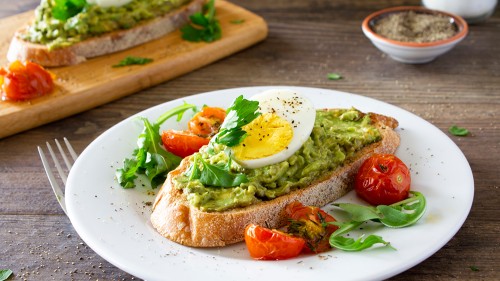Anti-Inflammatory Diet: Benefits, Food Lists, Tips, and More
Published on April 13, 2022
Medically Reviewed by Natalie Olsen, MS, RDN
An anti-inflammatory diet is a nutritious way of eating that may be beneficial for certain health conditions. Anti-inflammatory diets have lots of nutrients and minimal added sugars and saturated fat. While anti-inflammatory eating doesn’t come with an official set of rules, there are some general tips you can follow to improve your diet.


Scientists have discovered that inflammation plays a crucial role in our health. Heart disease, cancer, type 2 diabetes, and autoimmune conditions have been linked to high inflammation levels. (1)
A blood test can help measure your inflammation levels. A protein in the blood, called C-reactive protein (or CRP), is one way to tell how much inflammation you have. (2)
It’s normal for inflammation levels to go up when you have a cold or a short-term infection. (1)
However, chronic, or lasting inflammation, can signal a bigger problem.
In addition to CRP, pro-inflammatory cytokines are cells from the immune system that can signal when inflammation levels are high. (3)
High inflammation means the immune system is in overdrive, and you might be fighting against an underlying disease.
Following an anti-inflammatory diet is one thing you can do to help bring the inflammation down.
It’s not always clear whether an anti-inflammatory diet is the primary reason for better health outcomes or if other factors, such as weight loss, are responsible. (3)
Nonetheless, an anti-inflammatory diet is a nutritious and tasty way of eating that can help crowd out less healthful choices.
What Is an Anti-Inflammatory Diet?
An anti-inflammatory diet focuses on the ingredients believed to bring down inflammation, while cutting back on those associated with higher inflammation levels.
However, some of the science connecting food and inflammation is murky.
But generally, pro-inflammatory foods include:
- Refined flour and grains (like white pasta and white rice)
- Sugar
- Saturated fat
- Trans fats (1)
Fried foods, soda, processed snack foods, sugary treats, red meat, and high-fat dairy products are examples of foods that may promote inflammation.
Only you can decide how strict of an anti-inflammatory diet you want to follow.
For some people, cutting down to two cans of soda per day instead of three is a positive change.
Others eliminate all trips to fast-food restaurants and vending machines by learning to cook fresh meals at home.
Being on an anti-inflammatory diet can be as simple as adding natural ingredients high in antioxidants.
For example, swapping in brown rice instead of white rice, adding a cup of green tea to your morning routine, and cooking with olive oil instead of butter are all steps towards more anti-inflammatory eating habits.
Foods that may reduce inflammation include:
- Avocados
- Dark chocolate with 70% cocoa or more (1)
- Fish and other seafood
- Flaxseeds and chia seeds
- Fruits and vegetables
- Ginger
- Green tea
- Nuts
- Red wine (in moderation)
- Turmeric
Thinking about what you can add to your diet rather than what to remove makes switching to an anti-inflammatory diet feel less overwhelming and more fun.
Summary
An anti-inflammatory diet doesn’t need to be complicated. Making small changes to eat less processed foods and more colorful fruits and vegetables will start you on the right path.
Who Benefits from an Anti-Inflammatory Diet?
Because anti-inflammatory diets are nutritionally sound, most people stand to benefit from them.
An anti-inflammatory diet can help manage disease symptoms, and it may also protect against health problems in the future.
You can modify an anti-inflammatory diet to suit your individual needs.
For example, if you’re a vegetarian or have food allergies, you can still find ways to eat a more anti-inflammatory diet without compromising your dietary requirements.
People may be interested in an anti-inflammatory diet for various reasons.
Some make the change because they’re trying to prevent disease, while others want to control an existing health condition’s symptoms.
Examples of those who might consider an anti-inflammatory diet include people with:
- Autoimmune conditions, such as lupus or rheumatoid arthritis (4, 5)
- Cancer (6)
- Crohn’s disease or ulcerative colitis (7)
- Depression (8)
- Heart disease (9)
- Infertility (10)
- Skin conditions, like psoriasis (11)
- Type 2 diabetes or obesity (which are inflammatory conditions) (12)
If you ask your doctor whether you should follow an anti-inflammatory diet, there’s a good chance they’ll be supportive. Anti-inflammatory eating styles are generally considered safe and nutritious.
You can experiment with different versions of this eating style to find out what works best for you.
Summary
Most people benefit from anti-inflammatory diets. Some choose an anti-inflammatory diet to control disease symptoms. Others do it to promote their general health and well-being.
Research on Anti-Inflammatory Diets
Any diet that reduces inflammation can be considered an “anti-inflammatory diet.”
Examples of anti-inflammatory diets include the Mediterranean, Nordic, and vegan diets. (13, 2)
One study measured the effects of a vegan diet on CRP levels in people with coronary artery disease.
Researchers found that following a vegan diet for eight weeks lowered inflammation by 32%.
These results support the benefits of dietary changes to lower inflammation associated with heart disease. (2)
Since rheumatoid arthritis symptoms flare up when inflammation levels are high, people with rheumatoid arthritis (RA) are commonly advised to follow an anti-inflammatory diet.
And there’s some solid research behind this recommendation.
Anti-inflammatory diets can have a positive effect on several aspects of RA. In addition to lowering inflammation, they promote healthy gut bacteria and healthy body weight. (14)
Research supports the intake of omega-3s, monounsaturated fats, fiber, vitamin D, probiotics, and antioxidants from plant foods (such as carotenoids and vitamin C), for RA prevention and management, so an anti-inflammatory diet is a good fit. (14)
Mediterranean diets are thought to be anti-inflammatory because of their high antioxidant content. Antioxidants are protective against the growth of cancer cells. (6)
Extra-virgin olive oil, legumes, fruit, vegetables, nuts, fish, and wine are some of the high-antioxidant foods associated with the benefits of a Mediterranean diet.
Anti-Inflammatory Diets for Brain Health
Multiple studies have evaluated the impact of an anti-inflammatory diet on mental health disorders.
A meta-analysis of 11 different studies determined that pro-inflammatory diets increase the chances of depression by 1.4 compared to anti-inflammatory eating habits. (8)
While many factors can contribute to depression, the potential benefits of an anti-inflammatory diet can be part of a multi-faceted treatment or prevention plan.
There’s also a growing interest in the role of inflammation in cognitive decline related to aging and Alzheimer’s disease.
More evidence is needed, but early research points to anti-inflammatory diets as a protective lifestyle change.
Antioxidants, polyphenols, and unsaturated fats, all found in an anti-inflammatory diet, help reduce levels of damaging inflammation in the brain. (15)
Furthermore, Mediterranean diets are linked to lower rates of cognitive decline. (15)
The Added Effects of Weight Loss
The long-term consumption of a Mediterranean diet is linked to lower cancer rates, either by direct or indirect effects.
Evidence suggests that the number of breast, colorectal, prostate, stomach, bladder, head and neck, biliary tract, pancreatic, and lung cancers, and cancers of the female reproductive system, may be reduced with a Mediterranean diet. (6)
However, it’s tough for researchers to say for sure whether a Mediterranean diet alone is an effective cancer prevention strategy for everyone. In most cases, diet is one part of the puzzle that can lower the likelihood of cancer.
There’s plenty of promising research supporting an anti-inflammatory diet.
But it’s also worth noting that some research on anti-inflammatory diets shows that the biggest reduction in inflammation is achieved by weight loss alone rather than a specific diet.
For instance, a small study of 30 participants with diabetes and prediabetes were randomized to follow an anti-inflammatory diet or the American Diabetes Association diet, found that both groups experienced better health. (3)
In this study, eliminating pro-inflammatory foods like saturated fat didn’t seem to make much difference in CRP and inflammatory cytokines.
As long as the participants lost weight, their inflammation levels improved, at least in the short term. (3)
Summary
There are several variations of anti-inflammatory diets. Research has shown potential benefits for people with heart disease, depression, dementia, rheumatoid arthritis, and various types of cancer. When dietary changes lead to weight loss, inflammation levels tend to go down regardless of the kind of diet.
Pros and Cons of an Anti-Inflammatory Diet
There are a lot of positive aspects to anti-inflammatory diets. Pretty much anyone can follow their own version of the diet, and most people stand to benefit from it.
One of the potential cons includes food costs.
Whole, fresh foods, like fruits, vegetables, and seafood, tend to be more expensive than processed, fast foods.
Fresh foods also don’t last long in the refrigerator. You may need to visit the grocery store more frequently and cook smaller portions that you’ll be able to finish.
If you need to pack your food to go, some anti-inflammatory meals need to be refrigerated.
However, fresh whole fruits, roasted nuts, and canned sardines are some examples of anti-inflammatory foods that can travel with you.
There can also be a learning curve when using new ingredients. If you’re not used to cooking, you’ll need to budget more time to prepare healthy meals.
Finding anti-inflammatory foods that require minimal prep, such as pre-sliced fruits and vegetable, can relieve some of this burden.
Remember, there’s nothing wrong with microwavable brown rice, canned beans, frozen fruits and veggies, or store-bought guacamole when you’re working towards adopting an anti-inflammatory diet plan.
You don’t have to make everything from scratch.
Try visiting your local farmer’s market to seek out anti-inflammatory foods and get tips on preparing them.
You may be surprised to find that you can spend less time and money by steering clear of the drive-thru and cooking in bulk to freeze meals for later.
Keeping your recipes simple and using fewer ingredients can make your meals healthier and easier to prepare.
A sprinkle of salt and pepper, along with a dash of olive oil or lemon, is often all that’s needed to create a delicious plate of grilled vegetables and fish.
Summary
There are a lot of benefits to adopting an anti-inflammatory diet. And a couple of the potential cons, such as higher food cost and the time required for food prep, can be avoided with proper planning.
Sample Meal Plan
Here’s what a five-day sample meal plan might look like on an anti-inflammatory diet:
Monday
- Breakfast: Oatmeal with chia seeds and berries, a cup of coffee with milk
- Snack: Plain Greek yogurt with chopped walnuts and dates
- Lunch: Quinoa bowl with beans and veggies
- Snack: Avocado dip with whole wheat crackers
- Dinner: Greek salad with tomatoes, onions, and cucumbers, topped with olive oil, vinegar, and grilled chicken, 1–2 glasses of red wine
Tuesday
- Breakfast: Fresh fruit and a handful of roasted pumpkin seeds, a cup of coffee with milk
- Snack: Whole wheat toast with almond butter
- Lunch: Grilled shrimp and vegetables, a side of brown rice
- Snack: Grapes and a few slices of cheese
- Dinner: Lentil and veggie soup with whole wheat crackers, a piece of grilled salmon
Wednesday
- Breakfast: Vegetable omelet filled with spinach, tomatoes, and a slice of cheese, a cup of green or black tea
- Snack: A bowl of fresh strawberries, a couple of pieces of dark chocolate
- Lunch: Greek salad with tomatoes, onions, and cucumbers, topped with olive oil, vinegar, and grilled chicken
- Snack: Plain Greek yogurt with chopped walnuts and dates
- Dinner: Indian curry with vegetables, brown rice, and colorful spices (including turmeric)
Thursday
- Breakfast: Oatmeal with chia seeds and fresh berries, a cup of coffee with milk
- Snack: A smoothie with Greek yogurt, a handful of spinach, and frozen fruit
- Lunch: Lentil and veggie soup with whole wheat crackers
- Snack: Avocado dip with whole wheat crackers
- Dinner: Grilled shrimp and vegetables on whole wheat pasta with olive oil and garlic, a couple of squares of dark chocolate for dessert
Friday
- Breakfast: Plain Greek yogurt topped with chopped nuts and cinnamon, a cup of green or black tea
- Snack: Fresh orange or pear
- Lunch: A whole wheat wrap stuffed with veggies and hummus
- Snack: A handful of raw almonds and dried apricots
- Dinner: Greek salad with tomatoes, onions, and cucumbers, topped with olive oil, vinegar, and grilled salmon, 1–2 glasses of red wine
The Bottom Line
If you’re curious to try an anti-inflammatory diet, most health professionals probably will tell you it’s a good idea.
Even if you have specific dietary restrictions, you can find ways to incorporate more anti-inflammatory foods into your diet.
Low-grade inflammation is a problem for many people, and it often goes undetected.
If you’re struggling with inflammation-related health conditions, including obesity, heart disease, and type 2 diabetes, you may be surprised to discover that an anti-inflammatory diet can make a real difference. (1)
If you go to your primary care doctor with a health concern, nutrition should be part of the discussion. Sometimes adjusting the way you eat is all that’s needed to bring your health back into balance.
It’s unlikely that an anti-inflammatory diet will interfere with medications or procedures.
Instead, eating a nutritious diet typically promotes healing and supports the effectiveness of other medical interventions you may need.
A registered dietitian can help you develop an anti-inflammatory diet tailored to your needs.
At WellnessVerge, we only use reputable sources, including peer-reviewed medical journals and well-respected academic institutions.
- Can Diet Help with Inflammation? - EatRight:
https://www.eatright.org/health/wellness/preventing-illness/can-diet-help-with-inflammation - Anti‐Inflammatory Effects of a Vegan Diet Versus the American Heart Association–Recommended Diet in Coronary Artery Disease Trial - PMC:
https://www.ncbi.nlm.nih.gov/pmc/articles/PMC6405545/ - Effect of the Anti-Inflammatory Diet in People with Diabetes and Pre-Diabetes: A Randomized Controlled Feeding Study - PMC:
https://www.ncbi.nlm.nih.gov/pmc/articles/PMC6550471/ - A randomized controlled cross-over trial investigating the effect of anti-inflammatory diet on disease activity and quality of life in rheumatoid arthritis: the Anti-inflammatory Diet In Rheumatoid Arthritis (ADIRA) study protocol - PubMed:
https://pubmed.ncbi.nlm.nih.gov/29678183/ - Proposed Anti-Inflammatory Diet Reduces Inflammation in Compliant, Weight-Stable Patients with Rheumatoid Arthritis in a Randomized Controlled Crossover Trial - PubMed:
https://pubmed.ncbi.nlm.nih.gov/34587253/ - Nutrients | Free Full-Text | Cancer and Mediterranean Diet: A Review | HTML:
https://www.mdpi.com/2072-6643/11/9/2059/htm - Nutrients | Free Full-Text | Food and Food Groups in Inflammatory Bowel Disease (IBD): The Design of the Groningen Anti-Inflammatory Diet (GrAID) | HTML:
https://www.mdpi.com/2072-6643/13/4/1067/htm - An anti-inflammatory diet as a potential intervention for depressive disorders: A systematic review and meta-analysis - Clinical Nutrition:
https://www.clinicalnutritionjournal.com/article/S0261-5614(18)32540-8/fulltext - Anti-inflammatory diet and risk of heart failure: two prospective cohort studies - PubMed:
https://pubmed.ncbi.nlm.nih.gov/31975476/ - Nutrients | Free Full-Text | Adherence to the Mediterranean Diet, Dietary Patterns and Body Composition in Women with Polycystic Ovary Syndrome (PCOS):
https://www.mdpi.com/2072-6643/11/10/2278 - Association Between Mediterranean Anti-inflammatory Dietary Profile and Severity of Psoriasis: Results From the NutriNet-Santé Cohort - PubMed:
https://pubmed.ncbi.nlm.nih.gov/30046840/ - Mediterranean Diet Effects on Type 2 Diabetes Prevention, Disease Progression, and Related Mechanisms. A Review - PubMed:
https://pubmed.ncbi.nlm.nih.gov/32726990/ - Nutrients | Free Full-Text | Anti-Inflammatory Diets and Fatigue | HTML:
https://www.mdpi.com/2072-6643/11/10/2315/htm - Nutrients | Free Full-Text | Dietary Habits and Nutrition in Rheumatoid Arthritis: Can Diet Influence Disease Development and Clinical Manifestations? | HTML:
https://www.mdpi.com/2072-6643/12/5/1456/htm - Diet and Inflammation in Cognitive Ageing and Alzheimer’s Disease - PMC:
https://www.ncbi.nlm.nih.gov/pmc/articles/PMC6486891/






